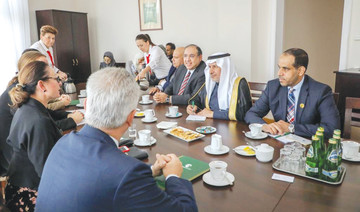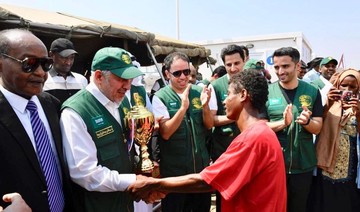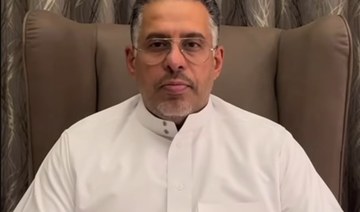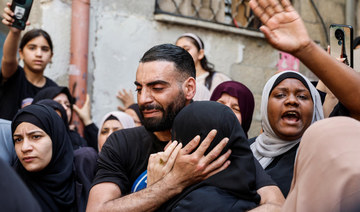JEDDAH: Saudi Arabia has given $84.7 billion in foreign aid to 79 countries between 1996-2018, according to Dr. Abdullah Al-Rabeeah, general supervisor of the King Salman Humanitarian Aid and Relief Center (KSRelief).
Al-Rabeeah highlighted Saudi Arabia’s contributions to international humanitarian and relief work, and said that the Kingdom had saved millions of people from conflicts and crises, regardless of their religion or ethnicity.
Al-Rabeeah was speaking during a seminar on the Kingdom’s humanitarian efforts at the University of Warsaw on Saturday, in the presence of Saudi Ambassador to Poland Mohammed Madani, Ambassador of Yemen to Poland Mervat Majali, and officials of the Foreign Ministry of Poland.
The royal decree establishing KSRelief was issued on May 13, 2015. Since then, it has carried out 482 projects in 42 countries worth $924,553,000. About 86 percent of the projects have been allocated to Yemen with a value of $659,271,000.
Al-Rabeeah said that the center implemented 206 projects for women worth $341,481,000, as well as 171 projects for children worth $504,962,000.
He added that the Kingdom had taken in 561,911 Yemeni refugees, 283,449 Syrian refugees and 249,669 refugees from Myanmar, the equivalent of 5.36 percent of the population of Saudi Arabia, putting it in second place internationally in terms of the number of refugees accepted.
Al-Rabeeah said that total Saudi assistance to Yemen since 2015 had reached $11.18 billion, noting that KSRelief has carried out 294 projects in Yemen in partnership with 80 UN and international and local NGOs.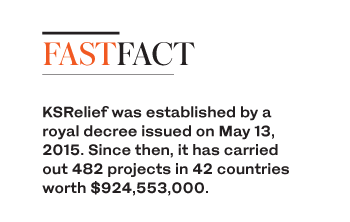
Al-Rabeeah said that the response of KSRelief to the appeal by the World Health Organization (WHO) and UNICEF for $66.7 million to combat the cholera epidemic in Yemen, as well as the projects allocated by KSRelief for women in Yemen from 2015 to date, amounted to 132 projects valued at $281,457,000. There have been 136 projects for children worth $469,867,000.
He highlighted that the Saudi project for mine clearance in Yemen, “Masam,” had been conducted by more than 400 people working in 32 teams within Yemeni territory during the preparation phase, and five specialized teams for rapid intervention, benefiting 9 million beneficiaries.
The costs of the project amounted to $40 million in the governorates of Marib, Aden, Taiz and Sanaa. More than 1 million land mines had been planted in Yemen, more than the number planted in World War II, he said.
Al-Rabeeah said that KSRelief was running a program to rehabilitate Yemeni children recruited by the Houthi militias, who use them as human shields. KSRelief is rehabilitating and providing care for 2,000 children through social, psychological, cultural and sports programs.
KSA grants $84.7bn in aid to 79 countries: KSRelief chief
KSA grants $84.7bn in aid to 79 countries: KSRelief chief

- Al-Rabeeah said that KSRelief was running a program to rehabilitate Yemeni children recruited by the Houthi militias
How sustainable tourism can help preserve Saudi Arabia’s iconic desert wildlife

- With desert tourism on the rise, experts say visitors and developers have a responsibility to respect local fauna
- The deserts of Saudi Arabia are home to more than 4,000 animal species, many of them critically endangered
ALULA: Although Saudi Arabia is home to a wealth of ecosystems, from its coastal mangroves and coral reefs to its high-altitude forests and lush oases, the Kingdom is perhaps best known for its deserts.
However, these landscapes, which are fast becoming popular with outdoor adventurers, are home to a remarkable array of animals, which inhabited the region long before the arrival of humans.
Despite the hardiness of these animals, given the harshness of their environment, the encroachment of humans into these pristine habitats is raising concerns among conservationists.
“The rapid growth in tourist flows in recent decades has been accompanied by diversification, both geographically, and in terms of tourism segments or products,” Basmah Al-Mayman, Middle East regional director of the UN Tourism (formerly UN World Tourism Organization), told Arab News.
“Desert destinations have shared in the benefits of this double-diversification process, making it an even more pressing priority to define a sustainable approach to tourism development in desert areas.”

As a Saudi national herself, Al-Mayman recognizes the value of the Kingdom’s precious ecosystems as a source of revenue and national pride. However, she believes the tourism industry, developers, and travelers themselves have a responsibility to act sustainably.
“In the desert, more than anywhere, with destinations still relatively untouched by the adverse effects tourism can bring, sustainability represents a particularly critical challenge,” she said.
“The messages conveyed by UN Tourism are not only preventive in character, but also offer stakeholders at international as well as local levels the advice and tools they need to combat poverty and desertification while enabling tourism to properly play its role as a vehicle for development.”

According to UN Tourism, sustainability principles refer to the environmental, economic, and socio-cultural aspects of tourism development. A balance must be established between these dimensions to guarantee its long-term sustainability.
Sustainable tourism should therefore make optimal use of environmental resources that constitute a key element in tourism development, while maintaining essential ecological processes and helping to conserve natural heritage and biodiversity.
As the largest country in the Middle East, occupying more than 80 percent of the Arabian Peninsula, Saudi Arabia is home to five distinct climatic regions.
These biomes include coastal fog desert, the southwestern savanna foothills, the southwestern montane woodlands, the Arabian Desert, the Nubo-Sindian tropical desert, and areas of semi-desert.
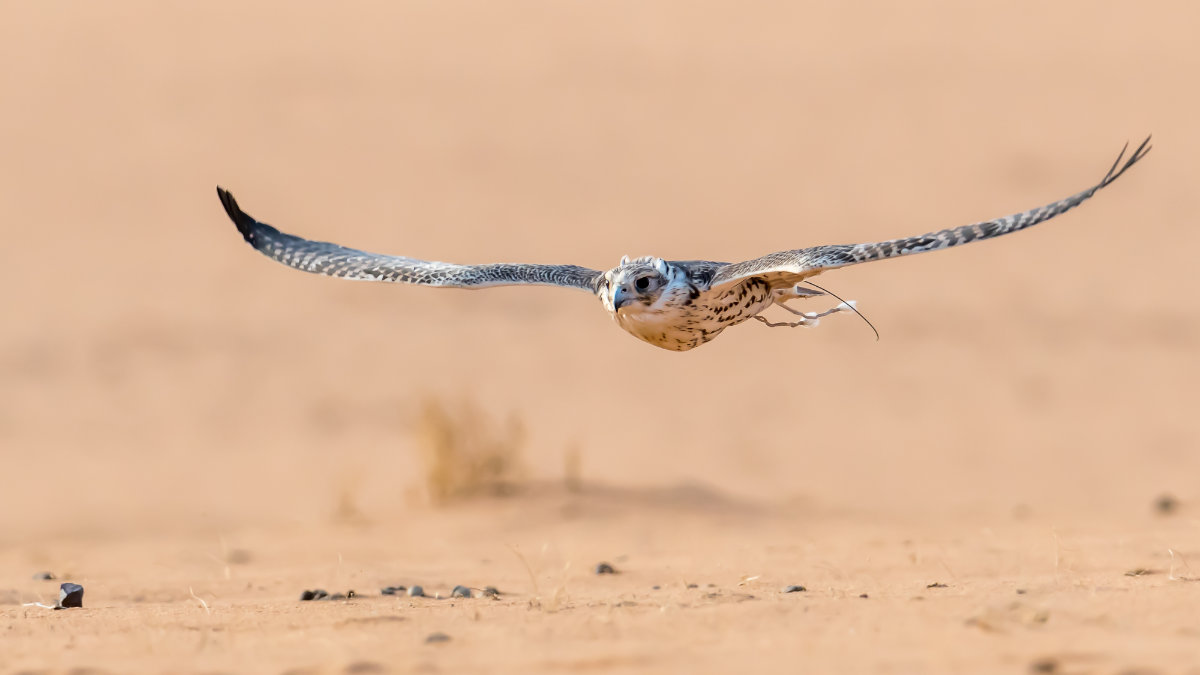
Extensive hunting in the 19th century resulted in the population decline of many of Saudi Arabia’s indigenous animals, including oryx, leopards, and cheetahs. The Kingdom has since imposed bans on poaching and launched breeding programs to help bolster populations.
Other wildlife found in these habitats included striped hyenas, mongoose, baboons, sand cats, and hopping desert rodents known as jerboa. Visitors willing to brave the region’s harsh temperatures may be rewarded with a glimpse of a Nubian ibex, sand gazelles, or a whole array of reptiles.
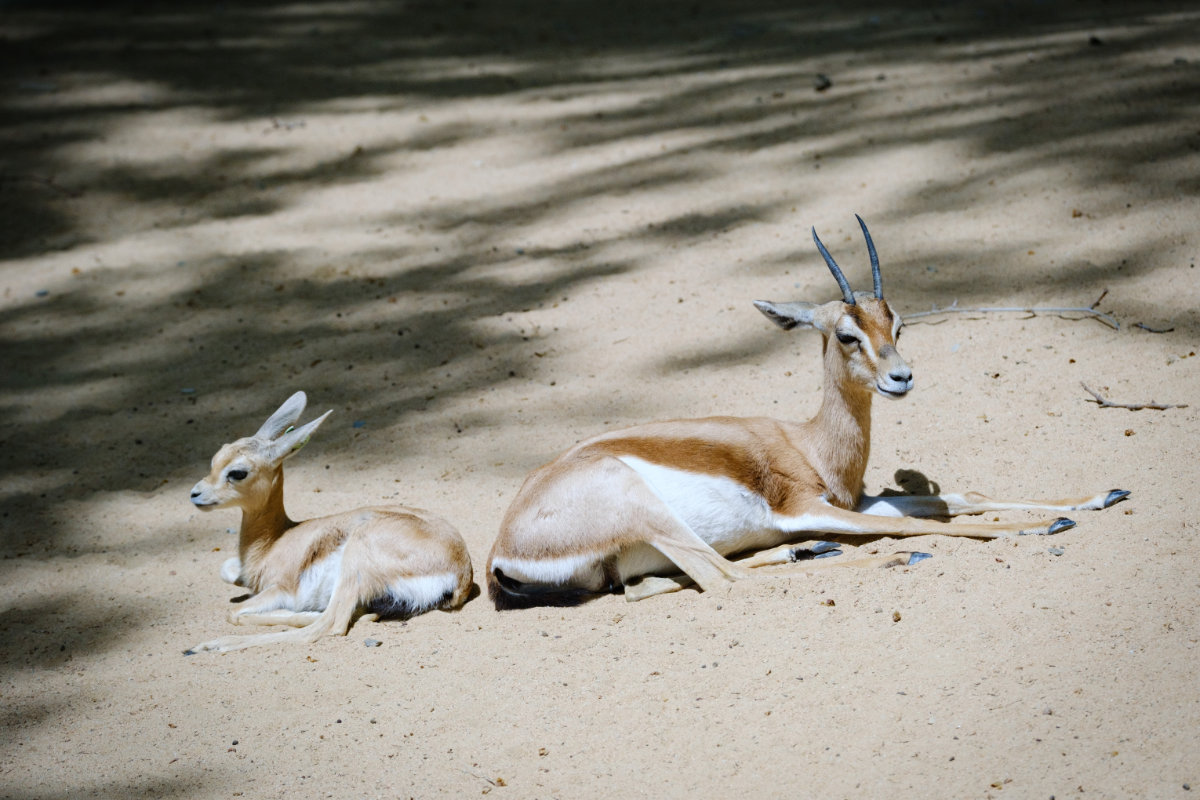
Occupying some 25 percent of Saudi Arabia’s territory, the Rub’ Al-Khali, also known as the Empty Quarter, is anything but what its name might suggest. The world’s biggest sand desert is in fact home to a dizzying array of wildlife.
Likewise, the Kingdom’s scrublands, steppes, mangroves, volcanic fields, palm oases, and mountain ranges are teeming with creatures — nesting, hunting, feeding, and burrowing, many of them out of sight, coming out only in the cool hours of night.
DIDYOU KNOW
• 2024 was designated the Year of the Camel by the UN and Saudi Ministry of Culture.
• AlUla has made great strides in ensuring that desert tourism is eco-friendly.
• UN Tourism has put forth structured targets to support sustainable desert tourism.
• National Center for Wildlife estimates there are 4,481 endangered species in the Kingdom.
No desert animal is perhaps better recognized than the camel. It is because of its iconic status that the UN and Saudi Arabia’s Ministry of Culture has designated 2024 as the “Year of the Camel.”
Just this past week, the second ever AlUla Camel Cup was celebrated in the Kingdom’s ancient northwestern region. The four-day event centered on the animal, which has become synonymous with the country’s identity.

The camel has been the Bedouin’s best friend for centuries, as well as a loyal companion and a lifeline. Even the Prophet Muhammad relied on camels for transportation and as a source of food and fuel.
Camels are not the only animals getting their moment in the limelight. Saudi Arabia’s National Center for Wildlife and the Saudi Green Initiative have been working hard to ensure none of the Kingdom’s fauna is overlooked.
Assigning an animal to be championed during a specific year, month, or day has been instrumental in raising awareness about the wellbeing and conservation of the region’s distinctive species.
In 2022, the Royal Commission for AlUla launched a campaign for the recognition of “International Arabian Leopard Day.” In 2023, the UN General Assembly unanimously designated Feb. 10 as the “International Day of the Arabian Leopard.”
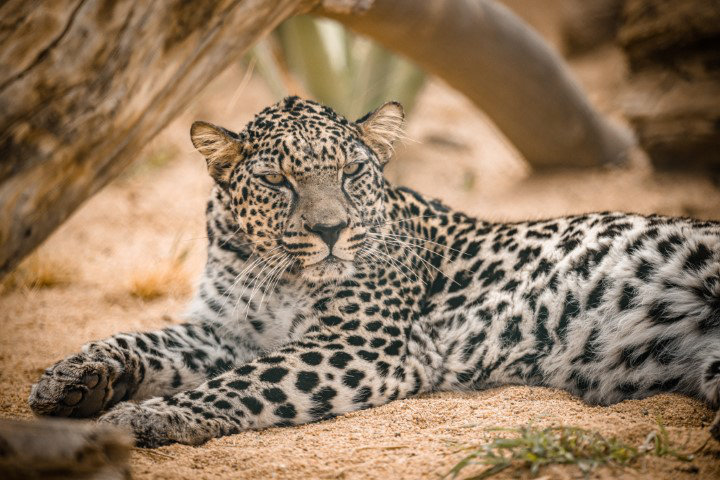
The Arabian leopard once enjoyed a range stretching across a large swathe of the Arabian Peninsula, from southern Jordan to Yemen.
But, after years of human encroachment on its habitat, resulting in the depletion of its natural prey, the International Union for Conservation of Nature listed the big cat as a critically endangered species.
Saudi Arabia has long been at the forefront of animal conservation, with the Imam Abdulaziz bin Mohammad Royal Reserve Development Authority reintroducing more than 220 endangered species into the wild in the Kingdom’s royal reserves over the past five seasons.
Much of this has been done in tandem with sustainable tourism initiatives, designed to protect the Kingdom’s ecosystems, while providing jobs, services, and prosperity to local communities.
For instance, in the ancient deserts of northwest Saudi Arabia, framed by curious rock formations with their dramatic silhouettes, the lush green oasis of AlUla has been continuously occupied by humans since before the 12th century.
Throughout that time, animals have been vital to the area and to the livelihoods of its human residents.
In line with Saudi Vision 2030, the Royal Commission for AlUla has launched an initiative to rehabilitate 65,000 hectares of degraded land, activating the space and resurrecting the harmony between humans and nature — an organic partnership that has defined the region for millennia.
Besides AlUla, nearly every other desert space in the Kingdom has introduced curated tours that mindfully lead humans into the wilderness with the intention of enjoying, honoring, and respecting the animals that live there.
The Kingdom has made significant strides in ensuring that its animals continue to flourish in a rapidly changing world and a nation that aims to become a major tourism magnet in the years to come.
But with more people, vehicles, and infrastructure coming to the desert, it is a collective responsibility to ensure visitors do so without disturbing these precious ecosystems and their animal inhabitants.

Riyadh Municipality confirms single company was responsible for recent food poisoning cases

- Officials said fast-food chain could be fined over the outbreak, which hospitalized dozens of people, and that all its branches and facilities in Riyadh and Al-Kharj remain closed
- The municipality did not name the company but Arab News reported last week that several cases of food poisoning appeared to be linked to the Hamburgini fast-food chain
RIYADH: Riyadh Municipality confirmed on Friday that the initial results of an investigation by health authorities suggest a single company was responsible for several cases of food poisoning last week, caused by the bacterium clostridium botulinum, that left dozens of people hospitalized.
It also confirmed the chain could be fined over the outbreak, which came to light on April 25, and that all of its branches and food-processing facilities in Riyadh and Al-Kharj remain closed. The amount of any fine will be set according to existing legislation based on a full investigation and taking into account the severity of the effects of the incident on the people who became sick, the municipality added.
It did not say how long the company’s branches and other facilities would remain closed, but said all food products they contained would be destroyed and the process of cleaning and disinfecting all buildings, tools and machinery will be supervised by officials from the municipality.
“We confirm the safety of food products for restaurants, kitchens, cafes and caterers in the Riyadh region, as no cases have been recorded from other than the aforementioned source,” the municipality said.
The statement on Friday did not name the company involved but Arab News reported last week that a number of food poisoning cases appeared to be linked to the Hamburgini fast-food chain.
On April 27, Dr. Mohammed Al-Abd Al-Aly, a spokesperson for the Ministry of Health, posted a message on social media platform X in which he shared information about those affected by the food poisoning.
“Six cases have fully recovered after receiving appropriate health care, and two have been safely discharged,” he said. “However, 35 individuals remain hospitalized, with 28 of them in intensive care.”
Riyadh Municipality said health oversight teams took prompt action to investigate and monitor the situation as soon as they began to receive reports of the food poisoning cases.
On April 26, Nawaf Al-Fozan, the founder and CEO of Hamburgini, shared a video on the chain’s Instagram page in which he confirmed it was involved in the outbreak.
€1bn EU ‘bribe’ over Syrian refugees stirs anger in Lebanon

BEIRUT: Lebanon’s Prime Minister Najib Mikati on Friday vowed to step up deportations as part of a crackdown on illegal residents in the country.
“This matter is not up for debate, and orders have been given to the relevant authorities to implement what is necessary,” he said.
Mikati’s comments came after the EU on Thursday announced a €1 billion ($1.07 billion) aid package for Lebanon, mostly to boost border control in a bid to curb refugee flows across the Mediterranean Sea to Cyprus and Italy.
Lebanon hosts more than 1.5 million Syrian refugees.
In a television interview, Mikati said: “Any Syrian residing in Lebanon illegally will be deported, and a different approach will be taken toward all registered individuals compared to unregistered ones.”
While Mikati welcomed the announcement of increased European aid, some political and religious figures described the package as a “bribe” to resettle Syrian refugees in Lebanon, and warned that Lebanon is “not for sale.”
Local newspaper headlines highlighted the objections, which follow increasing numbers of murders, thefts, and kidnappings in recent months carried out by Syrians who entered Lebanon illegally.
Syrian inmates now make up 35 percent of Lebanon’s prison population, according to Interior Minister Bassam Mawlawi.
Cyprus recently complained about the increasing number of boats arriving on its shores carrying Syrians who traveled via Lebanon. Dozens remain stranded on the island, which refuses to accept them as refugees, and wants to return them to Lebanon.
Mikati said that there is “a European division” on the issue of safe areas in Syria for the return of refugees.
“We will undertake a campaign in this context to push the EU to take a decision that there are safe areas in Syria,” he added.
The announcement of the EU package was made as European Commission President Ursula von der Leyen visited Lebanon on Thursday with Cypriot President Nikos Christodoulides.
However, Nicolas Sehnaoui, a member of the Strong Lebanon parliamentary bloc, said: “Keep the billion euros, and take an additional billion in exchange for taking all the Syrian refugees to European countries.”
Razi Al-Hajj, a member of the Strong Republic bloc, described the presence of Syrian refugees in the country as a “ticking time bomb.”
He said: “If Mikati wants to dispel the doubts of the Lebanese about the EU’s agenda in Lebanon, and the government’s true intention, he must begin implementing what he promised, which (means) deporting anyone residing illegally on Lebanese territory.”
Change party MP Waddah Sadek said: “Those who are residing illegally in Lebanon — the number of whom is significant — should be deported. An appropriate solution should then be reached regarding those who sought refuge in Lebanon for fear of getting killed or persecuted.”
Jaafari Grand Mufti Sheikh Ahmad Kabalan said in his Friday sermon: “We don’t want to slaughter Lebanon with 1 billion poisoned euros.
“Europe is Washington’s partner in the devastation in Syria and the siege on Lebanon. I warn those in charge against assuming the role of Europe’s security and political guard. The Syrian refugees’ case requires an urgent resolution. We ran out of time, and our country’s demography, stability, security, economy and livelihood are threatened.”
Maroun Al-Khawli from the National Campaign for the Return of Syrian Refugees, said: “Lebanon will not be for sale under any circumstances.”
He said the aid package “is a humiliating deal for Lebanon’s dignity and sovereignty, and a dark spot in the history of the caretaker government.”
Shiite cleric Ali Mohammed Hussein Fadlallah said in his Friday sermon: “The European Union resorts to the financial aspect to persuade the Lebanese when it comes to the Syrian refugees’ file.
“However, this matter is not limited to the financial dimension. It requires us to address its root causes and organize the Syrian presence in a way that doesn’t cause any internal repercussions, concerns and tensions that might affect the relationship between Lebanese and Syrian refugees.”
In a statement, the Progress Party said: “The European countries’ policy ensures that the Syrian refugees’ boats don’t reach their shores. This is what made them offer Lebanon €1 billion to make up for their presence in the country.
“The governing system accepted the bribe to recycle itself at the expense of the accumulating crises without organizing this file.”
The party proposed setting up camps for Syrian refugees on the border, and securing their needs through international support.
Where We Are Going Today: ‘Jon & Vinny’s restaurant in Riyadh

- The atmosphere and decoration of the restaurant are standard, with wooden bench-style seating and walls decorated using pizza boxes
Los Angeles-based Italian restaurant Jon & Vinny’s has opened a location in Riyadh serving pizza, pasta, desserts and coffee.
Located in Al-Sulimaniyah, the Italian restaurant has four locations in the US, all in California: Fairfax, Brentwood, Slauson and Beverly Hills.
The Riyadh restaurant features a more casual laid-back dining experience as opposed to other Italian restaurants in the Saudi capital that offer a more refined dining atmosphere.
If you are looking for a luxury restaurant for a quiet date night, this is not the best option, but if you are searching for a trendy hang-out spot, Jon & Vinny’s is suitable for you.
The atmosphere and decoration of the restaurant are standard, with wooden bench-style seating and walls decorated using pizza boxes.
The restaurant founders, Jon Shook and Vinny Dotolo, attended the grand opening in Riyadh on April 17, saying that their mission is to offer authentic food that captures traditional Italian flavors.
The prices on the menu are average, with dishes ranging from SR65-75 ($17-20).
The menu offers a wide variety of pizzas, from “The Rosy,” a tomato and olive oil pizza with parmesan, to the “The Lola,” with fresh burrata, tomato, basil olive oil and a dash of sea salt.
One thing to note is that the pizza is quite authentic compared to other options in the city. The pizza crust is crispy, light and airy, allowing the freshness of the tomatoes and herbs to shine through.
Unlike other Italian restaurants, Jon and Vinny’s also offers different options for crust dips, such as ranch, garlic, buffalo, creamy Italian, pomodoro and olive oil.
In terms of drinks, the options on the menu include juices, soft drinks and caffeinated beverages such as americanos, cappuccinos and other coffee.
You may try the house-made lemonade, which is refreshing but a bit on the sour side. It is definitely great for guests looking for something tangy and refreshing for the Saudi summer heat.
For pasta options, you can try the pesto pasta, known on the menu as the pesto parmigiano oregano. The pasta is perfectly cooked al dente and the sauce is tasty but nothing new or innovative.
The lemon pasta and the spicy fusilli are the two highlight dishes of the restaurant.
When it comes to meat, there are limited choices on the menu. You may try the braised meatballs with ricotta and garlic bread.
The meatballs are very flavorful and seasoned well, with the flavors of the spices in the meatballs complimenting the simple and fresh red sauce.
The garlic bread which is offered with the meatballs is a bit on the charred side.
Another notable option on the menu is the Caesar salad with cheese sticks.
The freshness and quality of the ingredients shine through in the simple dishes.
The restaurant is very trendy and social-media friendly. The wall of Jon and Vinny’s pizza boxes is the perfect backdrop for photos.
Although the restaurant is small, it does offer an open-style kitchen where guests can approach the kitchen area and see the chefs cooking each meal.
For dessert, the restaurant offers a variety of sweets, including cheesecake and chocolate cake.
You will find the staff incredibly friendly.
Jon & Vinny’s offers breakfast, lunch and dinner, and is open from 8 a.m. to midnight.
Austin: No indication Hamas planning attack on US troops

- Israel has killed more than 34,000 Palestinians, according to Gaza’s Health Ministry
WASHINGTON: US Defense Secretary Lloyd Austin said he did not see any indication Hamas was planning any attack on US troops in Gaza but added adequate measures were being put in place for the safety of military personnel.
“I don’t discuss intelligence information at the podium. But I don’t see any indications currently that there is an active intent to do that,” Austin said during a press briefing.
“Having said that ... this is a combat zone and a number of things can happen, and a number of things will happen.”
Austin’s remarks came as the US military said it was temporarily pausing the offshore construction of a maritime pier because of weather conditions and instead would continue building it at the Israeli Port of Ashdod.
FASTFACT
The US military says it is temporarily pausing the offshore construction of a maritime pier because of weather conditions.
The maritime pier, once built, will be placed off the coast of Gaza in a bid to speed the flow of humanitarian aid into the enclave.
“Forecasted high winds and high sea swells caused unsafe conditions for soldiers working on the surface of the partially constructed pier,” the US military said in a statement.
“The partially built pier and military vessels involved in its construction have moved to the Port of Ashdod, where assembly will continue,” it added.
Earlier this week, the Pentagon said about 50 percent of the pier had been constructed.
Israel has sought to demonstrate it is not blocking aid to Gaza, especially since President Joe Biden issued a stark warning to Prime Minister Benjamin Netanyahu, saying Washington’s policy could shift if Israel fails to take steps to address civilian harm, humanitarian suffering, and the safety of aid workers.
US officials and aid groups say some progress has been made but warn it is insufficient, amid stark warnings of imminent famine among Gaza’s 2.3 million people.
The humanitarian situation in Gaza — which has been devastated by more than six months of Israeli operations against Hamas — remains dire, with a senior US administration official saying last week that the territory’s entire population of 2.2 million people is facing food insecurity.


